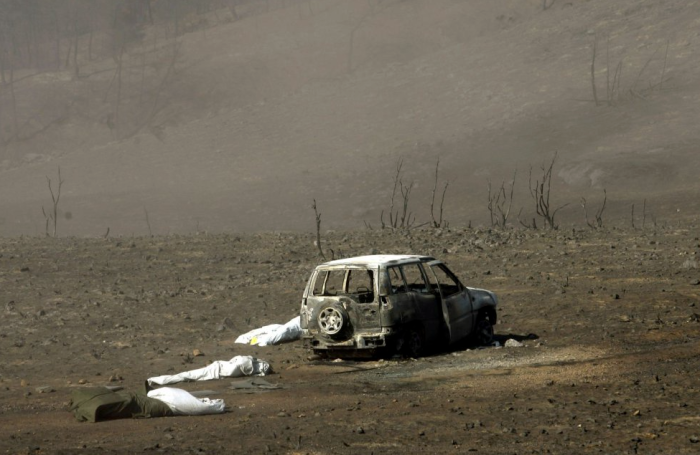The $64,000 question: “Is free camping allowed in Spain?” and the answer is – as in so many other areas of Spanish life, the answer is, ”Yes, no and maybe.” – somewhat complicated to say the least!
First, the “Yes” bit; there is a so-called ‘Mother’ law that is generic to the whole country that states that free camping is essentially legal under certain restrictions. This law is Article 46.1 of the order for July 28th, 1966. It’s worth quoting and translating:
El artículo 46.1 de la orden del 28 de julio de 1966, señala que “fuera de los campamentos de turismo no podrán instalarse conjuntamente más de tres tiendas o caravanas, sin que en ningún caso pueda exceder en diez el número de campistas, ni prolongarse la acampada en el mismo lugar durante más de tres días. Se entenderá que la acampada es conjunta cuando entre los grupos de tiendas haya una distancia inferior a 500 metros”.
Or in English (my translation):
Article 46.1 of the order for July 28th states that, “Apart from tourist camp sites no more than three tents of caravans may be placed at the same location, nor should there be more than 10 campers, nor may the camp be in place for more than three days. Tents and (caravans) within 500 metres of each other are considered to be part of the same group.
So far so good, however, there are a range of fairly common sense exceptions to this, however, the main ones being that it is prohibited to free camp within 200 metres of the sea, within a few kilometers of military installations, within a few kilometers of a regular camp site (when it’s open I presume) and in protected areas like national parks, natural parks, etc. (be especially aware of bird sanctuaries called ‘ZEPA’s, (Zona Excepcional de Protección de Avifauna) – I think all of these have to be signposted as such, but they usually are. However I know of several Parques Naturales that have their own rules which allow camping, but this is usually in special classes and areas, e.g. over 2,200 metres, which are unlikely to be accessible by any kind of motor. Conversely National Parks, which are managed directly by the central environment ministry as opposed to the regional equivalents, always have a total ban on wild camping.
This brings me to the complicated bit, which came in with the new Spanish Constitution of 1978, which created seventeen ‘autonomous regions’ each with considerable though varying powers to make their own legal codes with their own territory.
Bearing in mind that I’m nothing more than an amateur observer, this is the summary of the regional restrictions:
Camping totally prohibited:
Andalusia, Aragon, Asturias, Extremadura, Galicia, Navarra and Valencia
Local rules, permits, etc.:
Cantabria, Murcia and La Rioja
Authorized zones, i.e. subject to national rules:
The Basque Country, Catalonia, Madrid, Castilla y León and Castilla la Mancha
Eagle eyed readers will note that this only adds up to thirteen out of the seventeen autonomous regions. The others are the Balearic and Canary Islands, and the two enclaves Ceuta and Melilla which are on the mainland of Africa. I haven’t explored these as there’s not too much interest for the roving biker.
In all cases for details it’s best to contact the tourist board of each region. I’ve put a link to this topic in Wikipedia as this also has a map of the regions and you can follow through to the relevant home pages of each government – well I said it was complicated! – otherwise just Google up the region’s name with ‘turismo’ and you should be all right.
Free camping – on the ground:
So much for the theory. What about the practice – some guidelines:
- Don’t start quoting the law to a law enforcement officer at three in the morning! The police, the Guardia Civil in most of Spain (see The Police), have their job to do, which is to protect the public, the environment and property. S/he, or actually they, are just doing their job – and depending on how ‘orrible you look at three in the morning may be more nervous than you are!
- Do make it perfectly obvious that you are on the move – you should not have set out the garden gnomes on your AstroTurf lawn, nor should you have dug a six-foot latrine trench, built a shelter to stable your precious wheels . . . and say something like ¡Mañana me voy!, meaning, “I’m going in the morning!” And go – before 08.00!
So much for the generic rights, now for the exceptions, here are just a few:
- On the beach – definitely not allowed. The polemical Ley de la Costa states that no pernoctación is allowed within 100 metres of the intertidal zone – the high tide mark, naturally!
- National parks – totally prohibited and they check!
- Natural parks – generally prohibited at less that 2,000 metres – good luck!
- Historic monuments – are treated as private property, which is also a no-no!
- Military zones – I’ve woken up next to a lot of funny things in my time, but a land mine – not!
- Urban areas, outside camp site – these are local by-laws, besides the street sweepers will be around with high pressure hoses from 05.00!
But seriously, the spirit of law is about necessity – not romping around on the cheap. There’s nothing to beat a long evening totally alone with nature, and waking up to the trill of the dawn chorus . . . finding a place to do this is quite another matter, however – enjoy!
And finally, whatever you do – Don’t Light a Fire!

The bodies of five volunteer fire-fighters scatered around their Nissan jeep after it was overwhelmed by a terrible fire started by a fool lighting a BBQ …